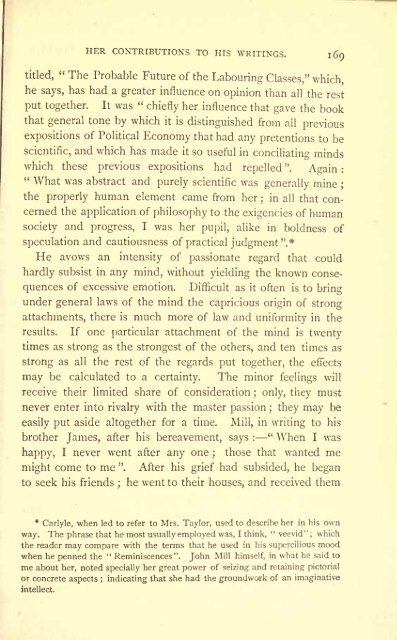John Stuart Mill: A Criticism with Personal Recollections
John Stuart Mill: A Criticism with Personal Recollections
John Stuart Mill: A Criticism with Personal Recollections
You also want an ePaper? Increase the reach of your titles
YUMPU automatically turns print PDFs into web optimized ePapers that Google loves.
HER CONTRIBUTIONS TO HIS WRITINGS.<br />
169<br />
titled,<br />
" The Probable Future of the<br />
Labouring Classes," which,<br />
he says, has had a greater influence on opinion than all the rest<br />
put together. It was<br />
"<br />
chiefly her influence that gave the book<br />
that general tone by which it is distinguished from all previous<br />
expositions of Political Economy that had any pretentions to be<br />
scientific, and which has made it so useful in conciliating minds<br />
which these previous expositions had repelled ".<br />
" What<br />
Again<br />
:<br />
was abstract and purely scientific was generally mine ;<br />
the properly human element came from her ; in all that con<br />
cerned the application of philosophy to the exigencies of human<br />
society and progress, I was her pupil,<br />
alike in boldness of<br />
speculation and cautiousness of practical judgment".*<br />
He avows an intensity of passionate regard that could<br />
hardly subsist in any mind, <strong>with</strong>out yielding the known conse<br />
quences of excessive emotion. Difficult as it often is to bring<br />
under general laws of the mind the capricious origin of strong<br />
attachments, there is much more of law and uniformity in the<br />
results. If one particular attachment of the mind is twenty<br />
times as strong as the strongest of the others, and ten times as<br />
strong as all the rest of the regards put together, the effects<br />
may be calculated to a certainty. The minor feelings will<br />
receive their limited share of consideration ; only, they must<br />
never enter into rivalry <strong>with</strong> the master passion ; they may be<br />
easily put aside altogether for a time. <strong>Mill</strong>, in writing to his<br />
brother James, after his bereavement, : says<br />
" When I was<br />
happy, I never went after any one ; those that wanted me<br />
might come to me ". After his grief had subsided, he began<br />
to seek his friends ;<br />
he went to their houses, and received them<br />
*<br />
Carlyle, when led to refer to Mrs. Taylor, used to describe her in his own<br />
"<br />
way. The phrase that he most usually employed was, I think, veevid" ; which<br />
the reader may compare <strong>with</strong> the terms that he used in his supercilious mood<br />
"<br />
when he penned the Reminiscences". <strong>John</strong> <strong>Mill</strong> himself, in what he said to<br />
me about her, noted specially her great power of seizing and retaining pictorial<br />
or concrete aspects ; indicating that she had the groundwork of an imaginative<br />
intellect.

















